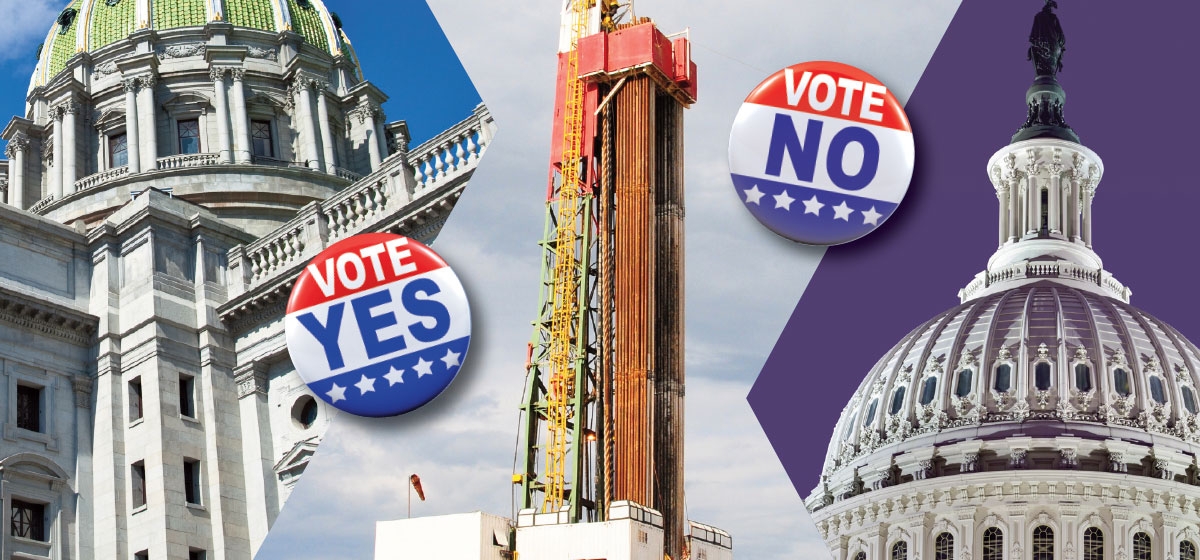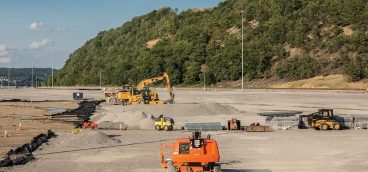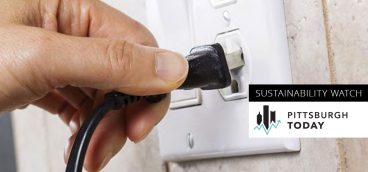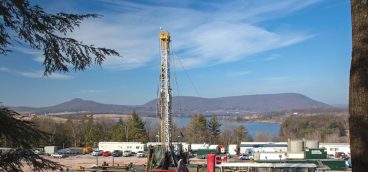Politics and the Marcellus Shale

It was Nov. 3, one day after the stunning midterm elections that had routed the Democrats and left the party in disarray both nationally and in Pennsylvania.
The political landscape was still smoldering when Karl Rove, one of the key architects of that Republican victory, stepped to the podium in a Pittsburgh conference center and boasted to a room full of gas industry executives that, at least as far as he was concerned, the gas industry had won a major victory.
“Climate is gone,” he declared, to a smattering of surprisingly tepid and polite applause. He was referring, of course, to the widely accepted fact that the Republicans’ pending control of the House of Representatives and their gains in the United States Senate, had, at least for the next two years, ended any meaningful discussion about climate change legislation. It had also stanched the progress, if temporarily, of cap and trade legislation, efforts to limit the amount of greenhouse gases that could be cheaply and legally pumped into the atmosphere.
It’s not clear precisely why Rove chose that particular venue for his triumphal tub thumping, and, through a spokesman, he declined to explain his comments further. If instead he had been speaking to coal industry executives and analysts, or to representatives of the oil industry, his pronouncement of death for climate change legislation might have received a warmer reception. After all, those industries had pumped millions of dollars into the coffers of candidates in this election cycle, most of them Republicans, including the newly elected junior senator from Pennsylvania and climate change skeptic, Pat Toomey. And those industries were bristling with optimism that the new young Turks in Washington and in state houses across the country would soon take a more accommodating stance toward fossil fuels than the Democrats had.
But Rove wasn’t speaking to those industries that day, at least not directly. He was speaking to an industry that, for the past several years, has tacitly embraced the notion that climate change is a serious threat and has at the same time made its product’s comparative environmental advantages over coal and oil one of its prime selling points; touting at every opportunity studies that show that natural gas burns twice as cleanly as coal and a third cleaner than oil, and pitching it as a fuel that could, if properly used, slow the advancement of global climate change and help free the nation from bondage to foreign energy producers.
In other words, according to gas analysts and industry leaders, Rove was speaking to an industry that has a lot to lose if the new Congress and the newly elected Republicans in Harrisburg actually took him at his word.
Fortunately for the gas industry, Rove may have indulged in a little bit of overstatement. Analysts say that the election may have slowed Washington’s drive to enact climate change legislation, but it hasn’t stopped it. And in fact, the new powers that be in Washington may actually turn out to be more supportive of the natural gas industry. Not only does the industry enjoy the support of the new Republican majority in the House and the newly empowered Republican minority in the U.S. Senate, it also may gain additional support among some surviving Democrats who see natural gas as the best of what they perceive to be bad options to reduce both greenhouse emissions and American dependency on foreign oil. It is, several analysts said, probably no coincidence, that the same day Rove was boasting in Pittsburgh, President Barack Obama made his most explicit comments to date supporting natural gas as an interim alternative fuel. And the industry also has gained new friends in Harrisburg, as evidenced by the convincing victory of Governor Tom Corbett, the gas industry’s favored candidate, the analysts say.
As important as it may be for the natural gas industry to have new friends in high places, there are critical economic factors that make the continued emergence of natural gas, especially natural gas from the Marcellus Shale, all but inevitable. Those factors were underscored in a Deutsche Bank report released after the November election that concluded that, even with little help from Washington, abundant and now comparatively inexpensive natural gas would fuel 35 percent of the nation’s electricity plants by 2030, a 23 percent increase. At the same time, coal, which now provides about half the nation’s electricity, would ultimately fuel less than a quarter of all electrical plants—even with hoped-for advances in the still largely experimental technique of carbon reduction, dubbed “clean coal technology.”
The way Deutsche Bank analyst Adam Sieminski sees it, coal’s decline is a matter of simple economics and is almost inevitable. Increased demand from overseas, especially from the emerging economic powerhouse of China, together with federal Environmental Protection Agency regulations, sooner or later will drive the cost of coal up to the point where it is no longer competitive with natural gas. And even though leading Republicans in the House and Senate have vowed to try to rein in the EPA, it is unlikely that in the long run those efforts will succeed.
The bottom line, Sieminski says, is “that natural gas still has an advantage.”
That sentiment is echoed by Kathryn Klaber, president and executive director of the Marcellus Shale Coalition. The way Klaber sees it, regardless of the political shift, there is strong support in Washington and Harrisburg for natural gas, and she expects that support to increase. Part of the reason, she argues, is that despite its environmental risks—the dangers of toxic spills, and the air and noise pollution generated by the extraction process—gas is less environmentally damaging than other fossil fuels. It’s more immediately accessible, and because of advances in technology that have made the exploitation of shale deposits like the Marcellus possible, it is a more reliable fuel than it has ever been. And that makes it a cheaper and more attractive alternative to coal, particularly as aging, coal-fired power plants approach the end of their lives and require costly retrofits to make them comply with decades of federal clean air legislation and regulations.
With other non-toxic energy sources, such as wind and solar, still decades away from being able to provide more than a scant 15 percent of the nation’s electrical needs, natural gas is poised to fill the void, she says. “When you’re thinking about a fuel like natural gas, it’s got environmental, energy security and patriotic attributes.”
What the political shift in Harrisburg has done, Klaber says, is bring “a new set of eyes, a new team looking at the Marcellus and what it means for Pennsylvania.”
In that, Klaber has found rare common ground with some in the state’s environmental community. Jan Jarrett, president of Penn Future, agrees that despite Karl Rove’s proclamation, there is momentum behind the natural gas industry that goes beyond any particular election cycle and beyond the seemingly wavering fortunes of carbon cap legislation. As an example, she cites an accord reached by 11 states, including Pennsylvania that would in effect establish a regional carbon cap, similar to a law enacted by California. It’s a move that would benefit the natural gas industry and the environment.
Like Klaber, Jarrett also echoes Deutsche Bank’s findings that rising coal prices, the daunting cost of refitting outmoded coal-burning power plants, and the now steady and reliably priced supply of natural gas will mean that more gas-fired plants will come in line over the next several years, perhaps augmented by a mix of wind and solar sources.
Unlike Klaber, however, Jarrett believes that the industry’s political muscle, particularly in Harrisburg, is likely to play as big a role as economics in natural gas’s advance. “We have seen… that when the industry decides on a policy that it wants, it’s willing to deploy some pretty formidable resources in pursuit of that policy goal,” Jarrett says. The question is, she says, how will the industry use that clout? “They could make some progress here on the state level to open up new markets for themselves… I think some of the companies are open to negotiations about some of the policies that are of mutual interest to cutting climate [change] and retiring coal.”
In fact, it would not be the first time that the natural gas industry has done precisely that, she says. Last year Colorado adopted legislation requiring its electrical plants to reduce nitrous oxide emissions by up to 80 percent, effectively forcing coal-burning plants either to jettison coal in favor of gas or to invest in technology that would increase the cost of maintaining coal-burning plants to a point where they would no longer be economically competitive; a law widely supported by that state’s natural gas industry.
Any such move in Pennsylvania would likely face stiff and bitter resistance from the coal industry, Jarrett says, but that opposition may in the end prove futile. “One of the things that struck me over the last couple of years is that… the invasion of the gas industry into Pennsylvania is not just something that you see on the ground in terms of drilling rigs. It’s something you see in the halls of the Capitol. And the political dynamic has been shaken up. Coal? It’s been here forever, going back as far as the robber baron days… Well, you know, there’s a new set of robber barons. The coal industry still has got a lot of clout, but the new growing industry—the new opportunity—is viewed through political lenses as gas.”
Still, there are those who fret that the reshuffling of the political deck in Washington and Harrisburg may not slow the development of the Marcellus or other shale plays—it may mean less attention is paid to the environmental risks the gas industry poses.
Among those who worry is the now-senior U.S. senator from Pennsylvania, Bob Casey. “Most people see the momentum behind this,” Casey says. “Frankly, I wish it weren’t moving as fast. I think the pace at which it has moved in the last year and a half with permits and other indicators has made it harder to stop and think. In other words, before we move too fast, let’s think about regulation, have a debate about that. But I think that the toothpaste is out of the tube; it’s going to be hard to freeze-frame and say, ‘Oh, let’s slow down.’ So that makes it more difficult for folks like us, who say we want to create the jobs and opportunity in the new industry, but we don’t want to do it at the expense of water quality and quality of life.”
Casey worries that the new Congress may not only ignore the environmental risks associated with drilling for natural gas, but that it may go even further and try to stifle attempts by the EPA to establish stiffer regulations on the industry. “I have a real concern about what a Republican majority in the House means for this, and what more Senate seats mean.”
But his fear, he says, is tempered somewhat by a kind of faith that the public’s growing awareness of the issues surrounding the development of the Marcellus may prove more influential than Congress or the state governments have been or could be. He cites his own legislation calling on drillers to disclose the chemical contents of the fluid they use to fracture natural gas wells hydraulically, as an example. While the legislation languished in Congress, pressure from the public and in the press ultimately forced several of the companies to voluntarily disclose that information. And that, Casey says, may be one very effective method of regulating the industry in the near term.
“We live in a TV world… a video or image world, but still, especially in a state like ours which is older and frankly has a high newspaper readership, when you have headlines and stories appearing regularly if not daily… and it goes over a couple of months, that aggregates into an impression… So I think people are just a lot more aware of this issue and the debate now than they were a year ago. I may not have as many supporters in Congress after November, but the press coverage of this will continue and in some ways will be amplified… I think there are people in our state that are middle-of-the-road… concerned and maybe anxious. And there have to be watchdogs out there.”





